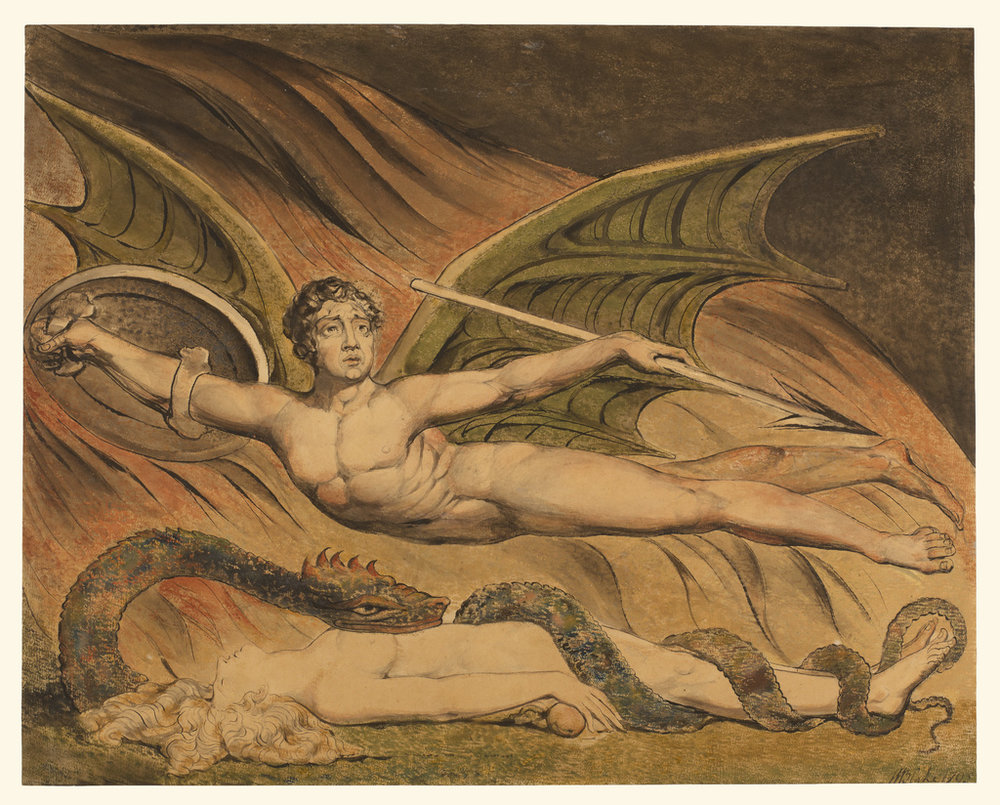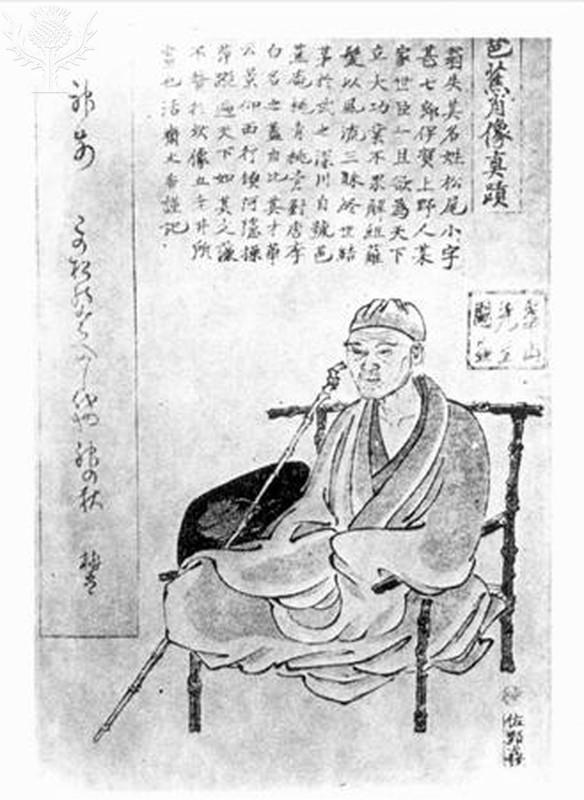Tabitha Sanders

William Blake (British, 1757 – 1827), / Satan Exulting over Eve / British, 1795, Graphite, pen and black ink, and watercolor, 42.5 × 53.5 cm (16 3/4 × 21 1/16 in.), 84.GC.49 / Getty Open Content
Olive struck the ground with her foot as she drove her scooter over and over the same patch of sidewalk in front of her house. It was her car, and she was driving it to work; she must take care to stop at all of the stoplights and to never go above the speed limit. Her little sister, Amy, had decided to quit the game, but the disappointment was only temporary. She had her imaginary friends to play with, and they made good playmates.
When they left, though, things did get a bit lonesome. Worse still was when her friends would withdraw, leaving little Olive with the enemies. She knew that they were only visions, that they weren’t really there. The man with the long white-hair was likely a figment from a dream, and the devil voice a secret sadness within her. The other enemies would often come and go, torture her and then leave forever. But these two stuck around for an awful long time, and Olive knew that they could stay forever if they wanted to.
The two enemies had made the decision, it seemed, to disturb and make miserable every aspect of her life. The white-haired man, who would so often appear in her mind and then flash away just as quickly, was in the habit of whispering things of past that had never happened.
As the white-haired man would confuse and distort the world she lived in, the devil voice would demand of her the payment of every second of her life. Any action she strove to do, be it turning her scooter around, picking a Tupperware cup to drink out of from the cabinet, speaking, was to some extent controlled by the devil voice. She would decide to turn her scooter around clockwise instead of counterclockwise, and the voice would change her action: If you don’t turn it counterclockwise, you will be trapped in a different time continuum. While wanting to choose the large blue cup, the voice would rebuke her: You’d better choose the small green cup, or else I will go into your heart when you drink. If about to say hello to someone: Keep your mouth closed or you’ll go to hell.
The battle, was continual. Perhaps it was made worse by the third enemy, the enemy who was real, her new stepfather.
He was a strange man, strange in his appearance, strange in his manner, and strange most of all in his preference for love from children. His acts shook the ground and broke it apart, leaving the shards of restlessness on which her family stood to drift away from each other.
Olive felt that the situation would have been easier had it not been for the visions that haunted her. But, no, the white-haired man would visit her and fill her waking dreamland with his version of reality; the devil voice would prohibit any freedom and terrify her beyond belief.
The girls went into a kind of years-long trance. No amount of consolation or screaming and yelling could snap them out of—not a bit of cajoling from their mother or cruel mind games from their stepfather would rescue them from it. It tied the two sisters together, each a source of comfort for the other.
They would talk to each other of the brutishness of their stepfather. Perhaps that was why her sister had left their game today so early on—the conversation had come up again. And with it had come an argument-turned-agreement.
Her sister had asked, “Do you think we need to tell someone?”
Olive felt a surge of panic.
“No, only if it happens again. And then we need to tell each other first.”
“But it did happen again, last night,” said Amy softly.
No, Olive, don’t you dare give in. You know it’s better kept a secret. Don’t tell… or else. The devil voice. You really don’t want to find out what I can do to you.
“Well,” Olive faltered again. Inside, she argued with the voice. Amy was crying. “Well. what if we promise each other something? If it happens even one more time, we will tell each other and then give each other a month to tell someone.”
Amy seemed to follow what she meant. “Is it really a promise?”
“Yes, I promise.”
The two shook hands like adults and looked each other in the eyes. “Okay. Who are we going to tell, then?”
“I don’t know. We should probably tell mom. But remember, only after a month if it happens again.”
Olive wondered if she find the courage to uphold that promise. And over the next few days she noticed that the devil voice was growing quieter, yet gaining strength in anger. Then there came a new voice, softer, clearly feminine.
Olive. Olive stared at the vision that began appearing, similar in ghostlike appearance to the white-haired man. It was a girl though, and much older than Olive. Olive. May we talk?
As much as Olive desired an escapade conversation, she had to decline the offer for fear of a permanent attachment to this potential enemy. “No. Please go away.”
I’ve come a long way to get here, little Olive. There are some things I need to tell you. Think of me as an older sister. The vision was becoming more vivid as the words grew clear.
“Fine, then. Go ahead.” It would be best to get this spiel out of the way before figuring a way to dispel this vision from her life.
The vision gently led her towards the backyard, where the two sat on bulging tree roots in the mossy shade.
I left you years ago. I am Olive.
Olive studied the figure. It certainly looked a bit like her, but it was too old. It was too different. “You aren’t really me.”
I’m you in the future, when you’re eighteen. I know I’m different, and it’s my fault that you came to be this way. When I left you, I found hatred and selfishness. It wasn’t until recently that I realized how much I left you alone to suffer. I thought I had done myself a favor, and therefore done you a favor, but the deeper into life I got I realized it wasn’t true. It seems that for every thing I left you alone to suffer, a reflection of it has shown up in my own life. Now I know your pain, and I am so sorry.
Olive looked down at the thick grass surrounding them, and kept herself quiet for a time. Without the devil voice here to interject its threats and commentary, she found it difficult to judge the veracity of this conversation. The vision seemed patient in that respect, and her silence brought Olive the encouragement to consider. “I really don’t know if this is real, but I forgive you.”
Thank you. Thank you ve
ry much. Her vision took a moment to examine the yard, as if remembering. May I ask you something?
Olive nodded.
You need to tell someone. It’s hard, but it’s important.
Olive murmured her agreement.
Don’t leave yourself behind. Always stay with yourself; help yourself grow. Don’t hide, and do all you can to keep goodness in your heart.
The vision was fading, and the different volume levels of the voices all mingled again. Her vision was gone, and again the devil voice came and scolded her on her belief of that vision. The white-haired man found evidence against her from his undocumented wealth of knowledge of time.
Upon returning inside, the sound of the swamp cooler overwhelmed her, and the sight of her stepfather slumped on the couch clutching his container of peanuts angered her. She walked quickly, silently, down the hallway into her shared bedroom, where she found Amy curled helplessly onto her bed. The music on the radio was turned low to her sister’s favorite band, and the beats and tunes of emotion mingled with her sobs.
“I just want mommy to come home from the store,” she sniffled. “I’m afraid of daddy.”
Olive climbed up onto the bed with her sister. “I am too. She’ll be back soon.”
Amy looked up at her face. “Do you still promise? Really promise?”
“Yes, I promise. Do you?”
“Yes. But,” Amy sat up, trying to gain composure. “I’m really afraid of telling.”
“I am too, Amy. It’s okay. I promise it’s okay.”
Tabitha Sanders graduated from Chino Valley High School, Arizona, in 2016 with the strong inclination to become a writer. Her dream is to support herself with writing while living in an RV.





